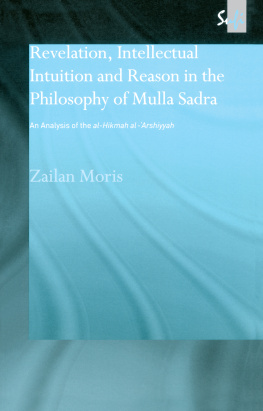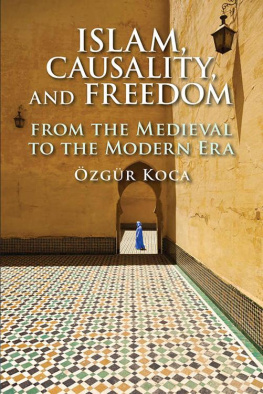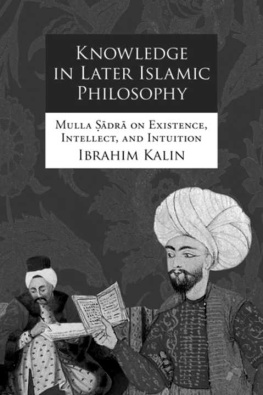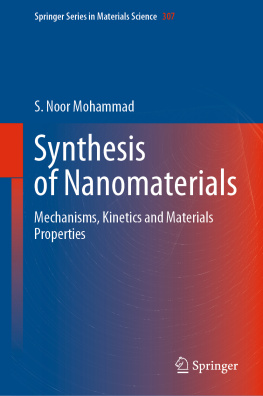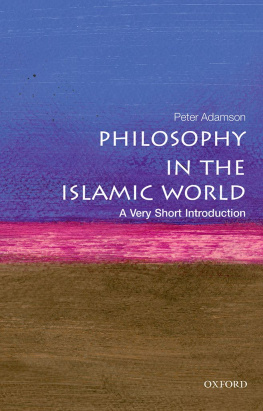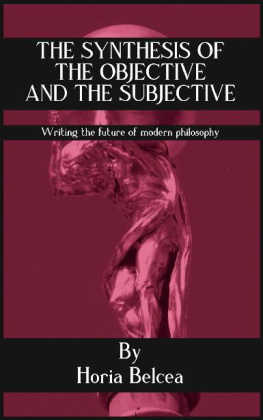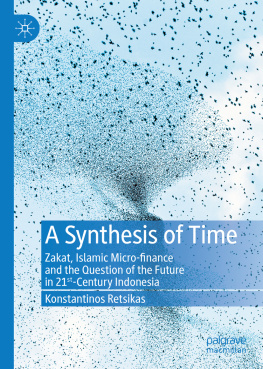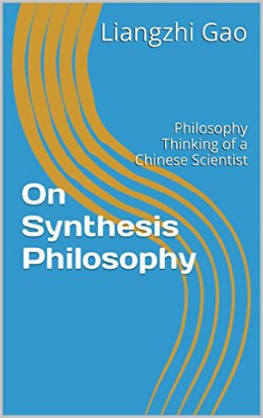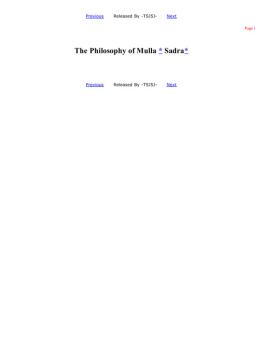
Revelation, Intellectual Intuition and Reason in the Philosophy of Mulla Sadra
ROUTLEDGECURZON SUFI SERIES
Series Editor: Ian Richard Netton
Professor of Arabic Studies
University of Leeds
The Curzon Sufi Series provides short introductions to a variety of facets of the subject, which are accessible both to the general reader and the student and scholar in the field. Each book will be either a synthesis of existing knowledge or a distinct contribution to, and extension of, knowledge of the particular topic. The two major underlying principles of the Series are sound scholarship and readability.
BEYOND FAITH AND INFIDELITY
The Sufi Poetry and Teaching of Mahmud Shabistari
Leonard Lewishon
AL-HALLAJ
Herbert W. Mason
RUZBIHAN BAQLI
Mysticism and the Rhetoric of Sainthood in Persian Sufism
Carl W. Ernst
ABDULLAH ANSARI OF HERAT
An Early Sufi Master
A.G. Ravan Farhadi
THE CONCEPT OF SAINTHOOD IN EARLY ISLAMIC MYSTICISM
Bernd Radtke and John OKane
SUHRAWARDI AND THE SCHOOL OF ILLUMINATION
Mehdi Amin Razavi
PERSIAN SUFI POETRY
An Introduction to the Mystical Use of Classical Poems
J.T.P. de Bruijn
AZIZ NASAFI
Lloyd Ridgeon
SUFIS AND ANTI-SUFIS
The Defence, Rethinking and Rejection of Sufism in the Modern World
Elizabeth Sirriyeh
REVELATION, INTELLECTUAL INTUITION AND REASON IN THE PHILOSOPHY OF MULLA SADRA
An Analysis of the al-Hikmah al-Arshiyyah Zailan Moris
Revelation, Intellectual Intuition and Reason in the Philosophy of Mulla Sadra
An Analysis of the al-Hikmah al-Arshiyyah
Zailan Moris

First Published in 2003 by RoutledgeCurzon
This edition publish 2012 by Routledge
2 Park Square, Milton Park, Abingdon, Oxfordshire OX14 4RN
605 Third Avenue, New York, NY 10017
Routledge is an imprint of the Taylor & Francis Group, an informa business
2003 Zailan Moris
Typeset in Horley Old Style by LaserScript Ltd, Mitcham, Surrey
All rights reserved. No part of this book may be reprinted or reproduced or utilized in any form or by any electronic, mechanical, or other means, now known or hereafter invented, including photocopying and recording, or in any information storage or retrieval system, without permission in writing from the publishers.
British Library Cataloguing in Publication Data
A catalogue record for this book is available from the British Library
Library of Congress Cataloging in Publication Data
A catalog record for this book has been requested
ISBN 0-7007-1502-9 (hbk)
ISBN 0-7007-1503-7 (pbk)
ISBN: 978-1-136-85859-8 (ebk)
DOI: 10.4324/9781315029023
To Abdul Jamil Khudri and Nadia Abdul Jamil, with gratitude for their support and sacrifices
Acknowledgements
First and foremost, I would like to express my profound and heartfelt gratitude to Professor Seyyed Hossein Nasr for opening up to me the world of Hikmat Philosophy. This work, which was originally submitted as a doctoral dissertation to the Department of Philosophy and Religion at The American University, Washington D.C., in Spring 1994, was written under his able supervision. During the years of my doctoral studies, I had the rare privilege and honor to be taught Islamic Philosophy generally and the philosophical thought of Mulla Sadra specifically by Seyyed Hossein Nasr, both in the modern mode of instruction in the classrooms of The George Washington University, as well as in the traditional method of transmission of Islamic Philosophy in a special reading class. I would also like to thank Professor Charles S.J. White, formerly Chairman of the Department of Philosophy and Religion at The American University and Professor David Rodier, for their assistance, guidance and support while I was a student there. My gratitude to Universiti Sains Malaysia and the Public Services Department of Malaysia for a four year scholarship and study leave to pursue by doctoral studies. Finally, my appreciation goes to Megawati Moris for her assistance in the preparation of the index of this work.
Introduction
DOI: 10.4324/9781315029023-1
For a long time in the West and in many parts of the Islamic world in which the Muslims learnt of their history mainly through Western sources, the prevalent view on Islamic Philosophy was that it began to weaken and disintegrate with the theologian and Sufi, Abu Hamid al-Ghazzalis (d. 505 A.H./1111 A.D.) critique of it and finally terminated with the death of Ibn Rushd or Averroes (d. 595 A.H./1198 A.D.) the reknowned commentator of Aristotle. who have brought forth the beginning of a recognition that Islamic Philosophy cannot be called Arabic Philosophy without misunderstanding certain fundamental aspects of the tradition and definitely did not die out in the twelfth century. Instead, it continued to develop and flourish in the eastern lands of Islam, especially in Persia and in certain parts of Iraq and India, but with a different orientation and course of development than that pursued in the West. It was a course of development which resulted in the founding of several important philosophical perspectives and schools which represent the articulate and profound philosophical responses of its thinkers to the combined demands of faith in the tenets of revelation, the logical requirements of reason and the spiritual need for God and the sanctified life.
Sadr al-Din Shirazi (9791050 A.H./157172 164041 A.D.) who is better known by the name of Mulla Sadra, is generally regarded as one of the most outstanding figures in later Islamic Philosophy. Many Islamic philosophers and scholars of Islamic Philosophy consider Mulla Sadras philosophical writings to represent the consummate expression of Hikmat Philosophy The effort towards such an integration and synthesis was already initiated by countless thinkers before Mulla Sadra, for example, Shihab al-Din Suhrawardi (d. 587 A.H./1191 A.D.), Afdal al-Din Kashani (d. 610 A.H./1213 A.D.), Qutb al-Din al-Shirazi (d. 710 A.H./1311 A.D.), Ibn Turkah Isfahani (d. 836 A.H./1432 A.D.) and especially among the Safavid sages such as Mir Damad (d. 1040 A.H./1631 A.D.), in whose works, Mulla Sadras synthesis is immediately anticipated. Undoubtedly, the works of these philosophers paved the way and provided the necessary groundwork for Mulla Sadras synthesizing effort. However, Mulla Sadras particular success and significance in this development is in the creation of a new, articulate and profound intellectual perspective in which revelation, reason and intellectual intuition or illumination are accorded their respective importance and roles in the human quest for true and certain knowledge. In Mulla Sadras perspective, revelation (wahy), discursive thought (fikr) and mystical unveiling (kashf) constitute three possible sources of knowledge and they can be brought to bear upon each other without contradiction. Revealed principles, rational arguments and intellectual intuitions or illuminations can be reconciled and unified to constitute an integral philosophical perspective which is capable of shedding light on such fundamental philosophical issues as the nature and structure of reality, the nature of the human soul, the nature of God, the purpose of creation, the meaning of human existence on earth and death etc.
Next page
